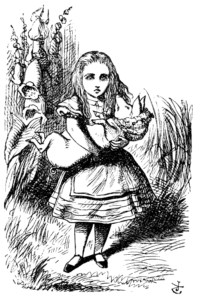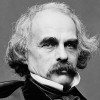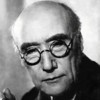All is not gold that glisters.
George Herbert (1593-1633) Welsh priest, orator, poet.
Jacula Prudentum, or Outlandish Proverbs, Sentences, &c. (compiler), # 306 (1640 ed.)
(Source)
Quotations about:
appearance
Note not all quotations have been tagged, so Search may find additional quotes on this topic.
In great actions men show themselves as they ought to be, in small actions as they are.
[Dans les grandes choses, les hommes se montrent comme il leur convient de se montrer; dans les petites, ils se montrent comme ils sont.]
Nicolas Chamfort (1741-1794) French writer, epigrammist (b. Nicolas-Sébastien Roch)
Products of Perfected Civilization [Produits de la Civilisation Perfectionée], Part 1 “Maxims and Thoughts [Maximes et Pensées],” ch. 1, ¶ 52 (1795) [tr. Hutchinson (1902), “The Cynic’s Breviary”]
(Source)
(Source (French)). Alternate translations:
In great matters men show themselves as they ought; in little, as they are.
[tr. Mathers (1926)]
In affairs of importance, men show themselves at their best advantage; in small matters they are seen as they are.
[tr. Merwin (1969)]
In great things, men show themselves as they want to be seen; and in little ones they show themselves as they are.
[tr. Siniscalchi (1994)]
In important matters, men display themselves as they want to be seen; in minor matters as they really are.
[tr. Parmée (2003), ¶45]
“If it had grown up,” she said to herself, “it would have made a dreadfully ugly child: but it makes rather a handsome pig, I think.” And she began thinking over other children she knew, who might do very well as pigs.
Lewis Carroll (1832-1898) English writer and mathematician [pseud. of Rev. Charles Lutwidge Dodgson]
Alice’s Adventures in Wonderland, ch. 6 “Pig and Pepper” [Alice] (1865)
(Source)
CLAUDIO: O, what authority and show of truth
Can cunning sin cover itself withal!William Shakespeare (1564-1616) English dramatist and poet
Much Ado About Nothing, Act 4, sc. 1, l. 35ff (4.1.35-36) (1598)
(Source)
To discern faults, though they be in fashion: Though Vice be clothed in cloth of gold, yet a good man will still know it. It is to no purpose for it to be apparelled in gold, it can never so well disguise it self but that it will be perceived to be of iron. It would cloak it self with the nobility of its Adherents, but it is never stript of its baseness, nor the misery of its slavery.
[Conocer los defectos, por más autorizados que estén. No desconozca la entereza el vicio, aunque se revista de brocado; corónase tal vez de oro, pero no por eso puede disimular el yerro. No pierde la esclavitud de su vileza aunque se desmienta con la nobleza del sujeto.]
Baltasar Gracián y Morales (1601-1658) Spanish Jesuit priest, writer, philosopher
The Art of Worldly Wisdom [Oráculo Manual y Arte de Prudencia], § 186 (1647) [Flesher ed. (1685)]
(Source)
(Source (Spanish)). Alternate translations:
Recognise Faults, however high placed. Integrity cannot mistake vice even when clothed in brocade or perchance crowned with gold, but will not be able to hide its character for all that. Slavery does not lose its vileness, however it vaunt the nobility of its lord and master.
[tr. Jacobs (1892)]
Know what is evil, however much worshiped it may be. Let the man of intelligence not fail to recognize it, even if clothed in brocade, or crowned with gold, because it cannot thereby hide its bane, -- slavery does not lose its infamy, however noble the master.
[tr. Fischer (1937)]
Know when something is a defect, even if it looks like the opposite. Honesty should be able to recognize vice even when it dresses in brocade. Sometimes it wears a crown of gold, but even then it cannot hide its iron. Slavery is just as vile when disguised by high position.
[tr. Maurer (1992)]
There is, incidentally, no way of talking about cats that enables one to come off as a sane person.
Dan Greenburg (1936-2023) American writer, humorist, journalist
In Bill Hayward, Cat People (1978)
(Source)
There are few people whom I really love, and still fewer of whom I think well. The more I see of the world, the more am I dissatisfied with it; and every day confirms my belief of the inconsistency of all human characters, and of the little dependence that can be placed on the appearance of merit or sense.
Being good is better far than seeming so.
[Refert sis bonus, an velis videri.]
Martial (AD c.39-c.103) Spanish Roman poet, satirist, epigrammatist [Marcus Valerius Martialis]
Epigrams [Epigrammata], Book 8, epigram 38 (8.38.7) (AD 94) [tr. Francis & Tatum (1924), ep. 415]
(Source)
(Source (Latin)). Alternate translations:
'Tis better bee, than seeme, good.
[16th C Manuscript]
'Tis not the same,
To covet and to merit a good name.
[tr. Hay (1755)]
Bounteous to be, or seem; the distance wide!
[tr. Elphinston (1782); Book 2, ep. 111]
It makes a difference whether a man is, or only wishes to seem, good.
[tr. Bohn's Classical (1859)]
It matters much whether thou'rt truly good, or would'st appear so.
[ed. Harbottle (1897)]
Wide is the difference 'twixt goodness and pretence.
[tr. Ker (1919)]
... the great gulf ’twixt goodness and pretence.
[tr. Pott & Wright (1921)]
There is a difference between goodness and pretence.
[tr. Shackleton Bailey (1993)]
You see, there’s a fundamental connection between seeming and being. Every Fae child knows this, but you mortals never seem to see. We understand how dangerous a mask can be. We all become what we pretend to be.
Patrick Rothfuss (b. 1973) American author
The Name of the Wind, ch. 92 “The Music That Plays” [Bast] (2007)
(Source)
No vice exists which does not pretend to be more or less like some virtue, and which does not take advantage of this assumed resemblance.
[Il n’y a point de vice qui n’ait une fausse ressemblance avec quelque vertu, et qui ne s’en aide.]
Jean de La Bruyère (1645-1696) French essayist, moralist
The Characters [Les Caractères], ch. 4 “Of the Heart [Du Coeur],” § 72 (4.72) (1688) [tr. Van Laun (1885)]
(Source)
See Erasmus.
(Source (French)). Alternate translations:
There is no Vice which has not some resemblance of some Virtue, or other, and which does not make its advantage of it.
[Bullord ed. (1696)]
There is no Vice which has not the false resemblance of some Virtue, or other, and which does not make its advantage of it.
[Curll ed. (1713)]
There is no vice which does not bear a misleading likeness to some virtue, and takes advantage of this.
[tr. Stewart (1970)]
It is because gold is rare that gilding has been invented, which, without having its solidity, has all its brilliance. — Thus, to replace the kindness we lack, we have devised politeness, which has all its appearance.
[C’est parce que l’or est rare que l’on a inventé la dorure, qui, sans en avoir la solidité, en a tout le brillant. Ainsi, pour remplacer la bonté qui nous manque, nous avons imaginé la politesse, qui en a toutes les apparences.]
Pierre-Marc-Gaston de Lévis (1764-1830) French noble, politician, author, aphorist
Maximes et Essais sur Différents Sujets, “Pensées Détachées,” # 180 (1808)
(Source)
(Source (French)). Frequently misattributed to his more famous father, Francis de Gaston, first Duke de Lévis.
The full aphorism also includes a final clause, "et au défaut de vertu, nous avons l'honneur, qui en a l'éclat" ("and, in default of virtue, we have honor, which has its luster").
The French was incorporated in standard French grammar books for many years.
The English translation shows up in several cases without any attribution and in varied contexts (1, 2, 3).
Politeness does not always imply goodness, equity, obligingness and gratitude; it at least provides the appearance of these, and makes a man seem outwardly what he should be inwardly.
[La politesse n’inspire pas toujours la bonté, l’équité, la complaisance, la gratitude; elle en donne du moins les apparences, et fait paraître l’homme au dehors comme il devrait être intérieurement.]
Jean de La Bruyère (1645-1696) French essayist, moralist
The Characters [Les Caractères], ch. 5 “Of Society and Conversation [De la Société et de la Conversation],” § 32 (5.32) (1688) [tr. Stewart (1970)]
(Source)
(Source (French)). Alternate translations:
Politeness does not always inspire Generosity, Equity, Complaisance, and Gratitude: it gives a man the appearances of those Vertues, and makes him seem that without, which he ought to be within.
[Bullord ed. (1696)]
Politeness does not always inspire Generosity, Justice, Complaisance and Gratitude; it gives a Man the Appearances of those Virtues, and makes him seem that without, which he ought to be within.
[Curll ed. (1713)]
Politeness does not always produce kindness of heart, justice, complacency, or gratitude, but it gives to a man at least the appearance of it, and makes him seem externally what he really should be.
[tr. Van Laun (1885)]
There are no vices more dangerous than those which simulate virtue.
Desiderius Erasmus (1465-1536) Dutch humanist philosopher and scholar
The Handbook of the Christian Soldier [Enchiridion Militis Christiani], sec. 32b (1501) [tr. Fantazzi (1989)]
(Source)
Alternate translation:
No sins are more dangerous than those which have the appearance of virtue.
[tr. Himelick (1963), ch. 14]
I worked my way back into a stony declivity and settled myself upon a low ledge. I began the troublesome shapeshifting work, which I paced to take me half an hour or so. Changing from something nominally human to something rare and strange — perhaps monstrous to some, perhaps frightening — and then back again is a concept some may find repugnant. They shouldn’t. We all of us do it every day in many different ways, don’t we?
When we think of evil, we think of something violent or demonic, something filled with hatred and wretchedly hungry to devour the good. But what if evil eats a salad at lunch and is polite, speaking rationally with nice table manners?
John Kass (b. 1956) American journalist, columnist
“Evil with salad and a nice red,” Chicago Tribune (19 Jul 2015)
(Source)
Race is the child of racism, not the father.
Ta-Nehisi Coates (b. 1975) American writer, journalist, educator
Between the World and Me, ch. 1 (2015)
(Source)
Coates continues:
And the process of naming "the people" has never been a matter of genealogy and physiognomy so much as one of hierarchy. Difference in hue and hair is old. But the belief in the preeminence of hue and hair, the notion that these factors can correctly organize a society and that they signify deeper attributes, which are indelible -- this is the new idea at the heart of these new people who have been brought up hopelessly, tragically, deceitfully, to believe that they are white.
After a certain number of years, our faces become our biographies. We get to be responsible for our faces.
Cynthia Ozick (b. 1928) American writer
Interview by Tom Teicholz, Paris Review, “The Art of Fiction” #95 (Spring 1987)
(Source)
See Camus and Orwell.
Discussion of similar quotations: When You Are Young, You Have the Face Your Parents Gave You. After You Are Forty, You Have the Face You Deserve – Quote Investigator.
Few are those who wish to be endowed with virtue rather than to seem so.
[Virtute enim ipsa non tam multi praediti esse quam videri volunt.]
Marcus Tullius Cicero (106-43 BC) Roman orator, statesman, philosopher
Laelius De Amicitia [Laelius on Friendship], ch. 26 / sec. 98 (44 BC)
Common translation. Alternates:
- "For not so many desire to be endowed with virtue itself, as to seem to be so." [tr. Edmonds (1871)]
- "For there are not so many possessed of virtue as there are that desire to seem virtuous." [tr. Peabody (1887)]
- "For many wish not so much to be, as to seem to be, endowed with real virtue." [tr. Falconer (1923)]
A full bosom is actually a millstone around a woman’s neck: it endears her to the men who want to make their mammet of her, but she is never allowed to think that their popping eyes actually see her.
Germaine Greer (b. 1939) Australian-English feminist, reformer, author, educator
“Curves,” The Female Eunuch (1970)
(Source)
The emotions I feel are no more meant to be shown in their unadulterated state than the inner organs by which we live.
Hannah Arendt (1906-1975) German-American philosopher, political theorist
The Life of the Mind (1978)
(Source)
Behold the hippopotamus!
We laugh at how he looks to us,
And yet in moments dank and grim,
I wonder how we look to him.
Behold me, Lucius; moved by thy prayers, I appear to thee; I, who am Nature, the parent of all things, the mistress of all the elements, the primordial offspring of time, the supreme among Divinities, the queen of departed spirits, the first of the celestials, and the uniform manifestation of the Gods and Goddesses; who govern by my nod the luminous heights of heaven, the salubrious breezes of the ocean, and the anguished silent realms of the shades below: whose one sole divinity the whole orb of the earth venerates under a manifold form, with different rites, and under a variety of appellations. Hence the Phrygians, that primæval race, call me Pessinuntica, the Mother of the Gods; the Aborigines of Attica, Cecropian Minerva; the Cyprians, in their sea-girt isle, Paphian Venus; the arrow-bearing Cretans, Diana Dictynna; the three-tongued Sicilians, Stygian Proserpine; and the Eleusinians, the ancient Goddess Ceres. Some call me Juno, others Bellona, others Hecate, and others Rhamnusia. But those who are illumined by the earliest rays of that divinity, the Sun, when he rises, the Æthopians, the Arii, and the Egyptians, so skilled in ancient learning, worshipping me with ceremonies quite appropriate, call me by my true name, Queen Isis. Behold, then commiserating your calamities, I am come to thy assistance; favoring and propitious I am come. Away, then, with tears; leave your lamentations; cast off all sorrow. Soon, through my providence, shall the day of deliverance shine upon you. Listen, therefore, attentively to these my instructions.
[En adsum tuis commota, Luci, precibus, rerum naturae parens, elementorum omnium domina, saeculorum progenies initialis, summa numinum, regina manium, prima caelitum, deorum dearumque facies uniformis, quae caeli luminosa culmina, maris salubria flamina, inferum deplorata silentia nutibus meis dispenso: cuius numen unicum multiformi specie, ritu vario, nomine multiiugo totus veneratur orbis. Inde primigenii Phryges Pessinuntiam deum Matrem, hinc autochthones Attici Cecropeiam Minervam, illinc fluctuantes Cyprii Paphiam Venerem, Cretes sagittiferi Dictynnam Dianam, Siculi trilingues Stygiam Proserpinam, Eleusini vetustam deam Cererem, Iunonem alii, Bellonam alii, Hecatam isti, Rhamnusiam illi, et qui nascentis dei solis inchoantibus illustrantur radiis Aethiopes utrique priscaque doctrina pollentes Aegyptii, caerimoniis me propriis percolentes, appellant vero nomine reginam Isidem. Adsum tuos miserata casus, adsum favens et propitia. Mitte iam fletus et lamentationes omitte, depelle maerorem: iam tibi providentia mea illucescit dies salutaris. Ergo igitur imperiis istis meis animum intende sollicitum.]
Apuleius (AD c. 124 - c. 170) Numidian Roman writer, philosopher, rhetorician [Lucius Apuleius Madaurensis]
Metamorphoses [Metamorphoseon] (The Golden Ass) Book 11, ch. 47 [tr. Bohn’s Library (1866)]
(Source)
Alt. trans. [tr. Adlington (1566)]: "Behold Lucius I am come, thy weeping and prayers hath mooved mee to succour thee. I am she that is the naturall mother of all things, mistresse and governesse of all the Elements, the initiall progeny of worlds, chiefe of powers divine, Queene of heaven! the principall of the Gods celestiall, the light of the goddesses: at my will the planets of the ayre, the wholesome winds of the Seas, and the silences of hell be diposed; my name, my divinity is adored throughout all the world in divers manners, in variable customes and in many names, for the Phrygians call me the mother of the Gods: the Athenians, Minerva: the Cyprians, Venus: the Candians, Diana: the Sicilians Proserpina: the Eleusians, Ceres: some Juno, other Bellona, other Hecate: and principally the Æthiopians which dwell in the Orient, and the Ægyptians which are excellent in all kind of ancient doctrine, and by their proper ceremonies accustome to worship mee, doe call mee Queene Isis. Behold I am come to take pitty of thy fortune and tribulation, behold I am present to favour and ayd thee, leave off thy weeping and lamentation, put away all thy sorrow, for behold the healthfull day which is ordained by my providence, therefore be ready to attend to my commandement."
The original Latin
Sometimes referenced as Chapter 5 within Book 11.
Many complain of their looks, but none of their brains.
(Other Authors and Sources)
Italian proverb
Also noted as a Jewish or Yiddish proverb.
This is also often cited to Sally Koslow, Little Pink Slips, ch. 5 (2007); it appears there as ""Many complain of their looks, few of their brains," but is described as an unoriginal needlepoint on a pillow cover.
See also La Rochefoucauld for a similar construction.
Nothing is more deceitful than the appearance of humility. It is often only carelessness of opinion, and sometimes an indirect boast.
I make this distinkshun between charakter and reputashun — reputashun iz what the world thinks ov us, charakter is what the world knows of us.
[I make this distinction between character and reputation — reputation is what the world thinks of us, character is what the world knows of us.]
Josh Billings (1818-1885) American humorist, aphorist [pseud. of Henry Wheeler Shaw]
Everybody’s Friend, Or; Josh Billing’s Encyclopedia and Proverbial Philosophy of Wit and Humor, “Lobstir Sallad” (1874)
(Source)
Judge nothing by the appearance. The more beautiful the serpent, the more fatal its sting.
William Scott Downey (fl. 19th C) American baptist missionary, aphorist
Proverbs, ch. 6, #8 (1853)
(Source)
She smoothed her hair back from her forehead and looked at herself in the mirror. She looked like she always looked. It was probably a truth about tragedy, she thought, while the tragedy is going on people look pretty much the way they looked when it wasn’t.
Great robbers always resemble honest folk. Fellows who have rascally faces have only one course to take, and that is to remain honest; otherwise, they would be arrested off-hand.
Jules Verne (1828-1905) French novelist, poet, playwright
Around the World in Eighty Days, ch. 6 (1873)
(Source)
A cheerful, easy countenance and behavior are very useful: they make fools think you a good-natured man, and they make designing men think you an undesigning one.
“If they were ugly, Peter, would you care half so much?” asked Nightingale. “There are some hideous things out there that can talk and reason and I wonder if you would be quite so quick to rush to their defense.”
“Maybe not,” I said. “But that just makes me shallow, it doesn’t make me wrong.”
In short, we can judge by nothing but Appearances, and they are very apt to deceive us. Some put on a gay chearful Outside, and appear to the World perfectly at Ease, tho’ even then, some inward Sting, some secret Pain imbitters all their Joys, and makes the Balance even: Others appear continually dejected and full of Sorrow; but even Grief itself is sometimes pleasant, and Tears are not always without their Sweetness: Besides, Some take a Satisfaction in being thought unhappy, (as others take a Pride in being thought humble,) these will paint their Misfortunes to others in the strongest Colours, and leave no Means unus’d to make you think them thoroughly miserable; so great a Pleasure it is to them to be pitied; Others retain the Form and outside Shew of Sorrow, long after the Thing itself, with its Cause, is remov’d from the Mind; it is a Habit they have acquir’d and cannot leave.
Benjamin Franklin (1706-1790) American statesman, scientist, philosopher, aphorist
“A Dissertation on Liberty and Necessity” (1725)
(Source)
A thing of beauty is a joy for ever:
Its loveliness increases; it will never
Pass into nothingness.
Virtue and learning, like gold, have their intrinsic value: but if they are not polished, they certainly lose a great deal of their lustre; and even polished brass will pass upon more people than rough gold.
Lord Chesterfield (1694-1773) English statesman, wit [Philip Dormer Stanhope]
Letter to his son, #118 (6 Mar 1747)
(Source)
Your beauty should not come from outward adornment, such as elaborate hairstyles and the wearing of gold jewelry or fine clothes. Rather, it should be that of your inner self, the unfading beauty of a gentle and quiet spirit, which is of great worth in God’s sight.
The Bible (The New Testament) (AD 1st - 2nd C) Christian sacred scripture
1 Peter 3:3-4 [NIV (2011 ed.)]
(Source)
Alternate translations:
Whose adorning let it not be that outward adorning of plaiting the hair, and of wearing of gold, or of putting on of apparel;
But let it be the hidden man of the heart, in that which is not corruptible, even the ornament of a meek and quiet spirit, which is in the sight of God of great price.
[KJV (1611)]
Do not dress up for show: doing up your hair, wearing gold bracelets and fine clothes; all this should be inside, in a person’s heart, imperishable: the ornament of a sweet and gentle disposition -- this is what is precious in the sight of God.
[JB (1966)]
You should not use outward aids to make yourselves beautiful, such as the way you fix your hair, or the jewelry you put on, or the dresses you wear. Instead, your beauty should consist of your true inner self, the ageless beauty of a gentle and quiet spirit, which is of the greatest value in God's sight.
[GNT (1976)]
Your adornment should be not an exterior one, consisting of braided hair or gold jewelry or fine clothing, but the interior disposition of the heart, consisting in the imperishable quality of a gentle and peaceful spirit, so precious in the sight of God.
[NJB (1985)]
Don’t try to make yourselves beautiful on the outside, with stylish hair or by wearing gold jewelry or fine clothes. Instead, make yourselves beautiful on the inside, in your hearts, with the enduring quality of a gentle, peaceful spirit. This type of beauty is very precious in God’s eyes.
[CEB (2011)]
Do not adorn yourselves outwardly by braiding your hair, and by wearing gold ornaments or fine clothing; rather, let your adornment be the inner self with the lasting beauty of a gentle and quiet spirit, which is very precious in God’s sight.
[NRSV (2021 ed.)]
Style has to do with the way in which ideas are believed and advocated rather than with the truth or falsity of their content.
Richard Hofstadter (1916-1970) American historian and intellectual
“The Paranoid Style in American Politics,” Herbert Spencer Lecture, Oxford (Nov 1963)
(Source)
Reprinted in Harpers (Nov 1964). Often misattributed to Douglas Hofstadter.
For the great majority of mankind are satisfied with appearance, as though they were realities, and are often more influenced by the things that seem than by those that are.
Appearances to the mind are of four kinds. Things either are what they appear to be; or they neither are, nor appear to be; or they are, and do not appear to be; or they are not, and yet appear to be. Rightly to aim in all these cases is the wise man’s task.
[F]or cheerfulness and content are great beautifiers, and are famous preservers of youthful looks, depend upon it.
Charles Dickens (1812-1870) English writer and social critic
Barnaby Rudge, ch. 82 (1841)
(Source)
Often given as "Cheerfulness and contentment are great beautifiers and are famous preservers of youthful looks."
I have never seen anyone who loves virtue as much as he loves beautiful women.
[吾未見好德、如好色者也。]
Confucius (c. 551- c. 479 BC) Chinese philosopher, sage, politician [孔夫子 (Kǒng Fūzǐ, K'ung Fu-tzu, K'ung Fu Tse), 孔子 (Kǒngzǐ, Chungni), 孔丘 (Kǒng Qiū, K'ung Ch'iu)]
The Analects [論語, 论语, Lúnyǔ], Book 9, verse 18 (9.18) and Book 15, verse 13 (15.13) (6th C. BC – AD 3rd C.) [tr. Huang (1997)]
(Source)
The two analects are the same in Chinese, although the second is prefaced by an expression of despair or exasperation (e.g., "It's hopeless!" or "I should just give up!"). In both instances, it is attributed by Sima Qian to Confucius' irritation while riding behind Duke Ling of Wei and his beautiful wife, Nan Tzu.
Legge and other early translators number these as 9.17 and 15.12, as shown below.
(Source: 9.18, 15.13, Chinese). Alternate translations:
I have not seen one who loves virtue as he loves beauty.
[tr. Legge (1861), 9.17, 15.12]
I have not yet met with the man who loves Virtue as he loves Beauty
[tr. Jennings (1895), 9.17, 15.12]
I do not now see a man who can love moral worth in man as he loves beauty in woman. (9.17)
I do not now see a man who loves moral worth as he loves beauty in women. (15.12)
[tr. Ku Hung-Ming (1898)]
I have never yet seen a man whose love of virtue equaled his love of woman. (9.17)
I have never yet seen as man as fond of virtue as of beauty. (15.12)
[tr. Soothill (1910)]
I do not see love of looking into the mind and acting on what one sees there to match love of someone having beauty. (9.17)
I have not seen anyone who loves acting from inwit as they love a beautiful person. (15.12)
[tr. Pound (1933)]
I have never seen anyone whose desire to build up his moral power was as strong as sexual desire. (9.17)
In vain have I looked for one whose desire to build up his moral power was as strong as sexual desire. (15.12)
[tr. Waley (1938)]
I have never yet seen people attracted by virtuous scholars as they are by beautiful women. (Reference)
I haven't yet seen people who love virtue as they love beauty. (Reference)
[tr. Lin Yutang (1938)]
I have yet to meet a man as fond of high moral conduct as he is of outward appearances.
[tr. Ware (1950), 9.18, 15.13]
I have yet to meet the man who is as fond of virtue as he is of beauty in women.
[tr. Lau (1979), 9.18, 15.13]
I have never come across anyone who admires virtue as much as he admires sexual attraction.
[tr. Dawson (1993), 9.18, 15.13]
I have never seen anyone who loved virtue as much as sex. (9.18)
I have never seen a man who loved virtue as much as sex. (15.13)
[tr. Leys (1997)]
I have not seen one person who likes the virtuousness as likes the beauteousness. (9.18)
I cannot see the person who likes the virtuousness as likes the beauteousness. (15.13)
[tr. Cai/Yu (1998)]
I have yet to meet the person who is fonder of excellence (de) than of physical beauty.
[tr. Ames/Rosemont (1998), 9.18, 15.13]
I have never seen anyone who loves virtue the way he loves beauty.
[tr. Brooks/Brooks (1998), 9.18, 15.13]
I've never seen anyone for whom loving Integrity is like loving a beautiful woman.
[tr. Hinton (1998), 9.18, 15.13]
I have yet to meet a man who loves Virtue as much as he loves female beauty.
[tr. Slingerland (2003), 9.18, 15.13]
I have never seen the person who loved virtue the way he loved physical beauty.
[tr. Watson (2007), 9.18, 15.13]
I have never met a person who loved virtue as much as he loved physical beauty.
[tr. Chin (2014), 9.18]
I have never seen anyone who loves virtues as much as sexy women.
[tr. Li (2020), 9.18, 15.13]
There are some people who state that the exterior, sex, or physique of another person is indifferent to them, that they care only for the communion of mind with mind; but these people need not detain us. There are some statements that no one ever thinks of believing, however often they are made.
“I quite agree with you,” said the Duchess; “and the moral of that is — ‘Be what you would seem to be’ — or, if you’d like it put more simply — ‘Never imagine yourself not to be otherwise than what it might appear to others that what you were or might have been was not otherwise than what you had been would have appeared to them to be otherwise.'”





















































